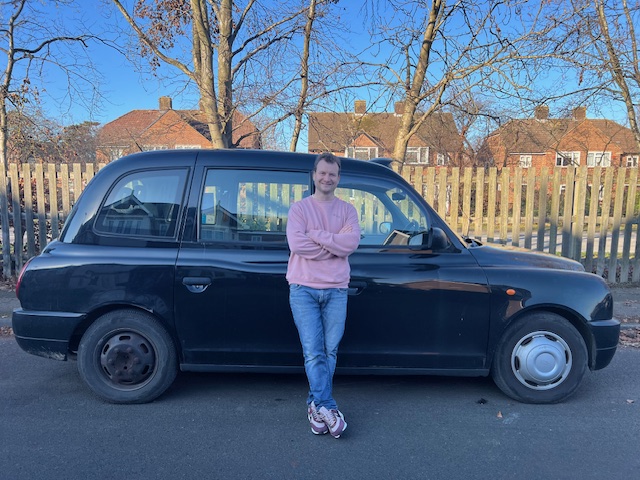I’ve just bought a decommissioned back cab and the first thing that massively shocked me was how expensive it was to insure. Here I’ll cover why we bought a Hackney carriage for private use and why taxis are so expensive to insure for personal use.

Why did I buy a decommissioned taxi for private use?
Well, I imagine it’s the same reason that most people buy a black cab, it’s because it is iconic. If you are even vaguely connected to the City of London few other images are more associated with the Square Mile than the Hackney carriage.
Almost all of our customers are in central London and a huge percentage of our users are too. We’ve also got the London Investor Show coming up so are going to wrap it in Good Money Guide livery and use it as a promotional tool.
That’s actually what the chap I bought it off was going to use it for. A husband and wife I had acquired it a year ago to show it off at their “English Teapot Museum” in Hungry, I kid you not. They had bought it with 160,000 miles on the clock and had driven it out to Hungry, only to find out that for various reasons they could not register it there so had to bring it back.
I’d been looking at Taxis on Autotrader that morning, and this one caught my attention. So I’d done a bit of due diligence and checked it from MOT etc. So, when I was on my way home from the gym at lunchtime and it pulled out in front of me, with a for sale sign in the window, I recognised the number plate and got a bit over-excited.
I actually chased it for about 10 minutes trying to flag him down. I eventually got through via the number on Auotrader and we did the deal at the side of the road after taking it for a little test drive.
Tibor, told me that he wanted to sell it before his insurance ran out, which makes sense. Whenever we get a new car, we usually time it in line with when the service, insurance, and MOT are due.
I got it well below the asking price and the reason why is obvious to me now. Getting decommissioned taxi insurance for private hire is extremely expensive.
How can you insure a decommissioned taxi?
Obviously after buying it, I was immediately keen to take it for a drive, and pick the kids up from school in it so went to the usual car insurance price comparison sites. All of them refused to insure it. However it didn’t stop them from passing my number over to a load of taxi insurance firms, who when cold-called me went on to say that they don’t do private insurance.
Oh my! I thought this is going to be worse than insuring a Range Rover in London.
But actually, it was much worse.
Fortunately, my dog walker’s business is called “The Dog Taxi”, and her father-in-law is a back cabbie, so she gave me a few pointers on Whatsapp. She did warn me as well that insuring a taxi for personal use “was not always the easiest and that there were only a handful of firms that did it”.
First, she recommended Cabsurance, who point blankly told me that don’t insure decommissioned taxis anymore. They recommended (as did our dog walker), Adrian Flux. But the guy from Cabsurance did also say they may be pulling out of the market.
I’ve always liked Adrian Flux, they insured my old ’69 MK1 Ford Capri and are basically the one-stop shop for exotic and specialist car insurance. Adrian Flux was always the only firm to quote when I had speeding points, or when I was younger and had a higher “risk profile”.
But they had a good ring around underwriters and got me a price. It was a ludicrous £2,600 a year, for third-party fire and theft. Insane seeing as I only paid £1k for the cab. But when it’s the only price in town, you don’t really have a choice do you?
So there you go. If you want to insure a decommissioned taxi for private use, you need to use a specialist insurance firm like Adrian Flux.
Why is it so expensive to insure a decommissioned Hackney carriage?
After I’d paid for the insurance I stayed on the line to have a chat with the broker about why it was so expensive. And the answer is a bit of a shame really.
Apparently, the majority of people who buy decommissioned taxis are only doing it so they can thrash them around corners, and because of that, they end up dinging a lot of other cars. So have a lot of claims against them.
One thing insurance companies know about is taking on risk, so if they have stats that show a lot of claims against a specific type of car, then the rate is going to be higher, or so high that they clearly don’t want the business.
Adiran Flux said it would be different if it was a classic or would just be used to go to car club meets and garaged most of the time. But because we are going to actually drive the Good Money Guide Taxi around the City of London, it falls well within the “high-risk vehicle” category.
Still, I shall enjoy driving it, a lot.

Richard is the founder of the Good Money Guide (formerly Good Broker Guide), one of the original investment comparison sites established in 2015. With a career spanning two decades as a broker, he brings extensive expertise and knowledge to the financial landscape.
Having worked as a broker at Investors Intelligence and a multi-asset derivatives broker at MF Global (Man Financial), Richard has acquired substantial experience in the industry. His career began as a private client stockbroker at Walker Crips and Phillip Securities (now King and Shaxson), following internships on the NYMEX oil trading floor in New York and London IPE in 2001 and 2000.
Richard’s contributions and expertise have been recognized by respected publications such as BusinessInsider, Yahoo Finance, BusinessNews.org.uk, Master Investor, Wealth Briefing, iNews, and The FT, among many others.
Under Richard’s leadership, the Good Money Guide has evolved into a valuable destination for comprehensive information and expert guidance, specialising in trading, investment, and currency exchange. His commitment to delivering high-quality insights has solidified the Good Money Guide’s standing as a well-respected resource for both customers and industry colleagues.


